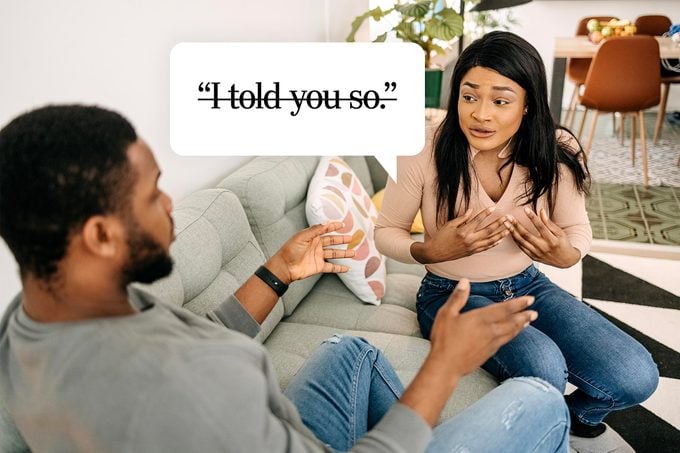12 Things Your Partner Should Never Say to You—or Vice Versa
Updated: May 15, 2024
What do experts wish you'd stop saying during arguments? These are the comparisons, exaggerations and generalizations you should ditch.

Trust and open communication are the cornerstones of a healthy relationship, and the words we choose not only have a profound impact on our partner’s feelings and well-being but also our overall relationship satisfaction. When we communicate with care and thoughtfulness, we strengthen our relationship, and our partners likely feel supported, cherished and loved. Unfortunately, when we’ve had a challenging day, are mentally or emotionally taxed or are in an argument, our significant other is likely going to get the brunt of our frustration and wrath in the moment. Still, there are things your partner should never say to you—or vice versa.
As a board-certified clinical and forensic neuropsychologist with extensive experience assessing and treating individuals and partners in my private practice and conducting clinical research, I’ve seen firsthand how certain phrases can erode trust and intimacy between partners.
Sometimes we say things we don’t mean, and other times, we don’t even realize that we’ve committed a relationship communication blunder that can cause significant harm and diminish relationship trust. Ahead, we’ll explore 12 things that should never be said in a relationship—and why these phrases can be so harmful.
Get Reader’s Digest’s Read Up newsletter for more relationship tips, humor, cleaning, travel, tech and fun facts all week long.
“You always ____” or “You never ____”
Using absolute statements like “You always” or “You never” can make your partner feel criticized and defensive. In fact, I’ve seen this phrase escalate conflicts between partners. One might feel unfairly attacked, while the other feels unheard or unappreciated. It’s important to address specific behaviors or situations rather than making sweeping generalizations about your partner’s actions.
Focus on specific behaviors or incidents and express your feelings using “I” statements. Express your specific need(s) and then offer a way that your partner can better support you. For example, say, “I felt dismissed yesterday during our conversation about my job. I just need you to hear me explain the challenge I’m having with my supervisor. Can we please take a few minutes to have that conversation today?”
“____ is much more ____ than you are”

Using comparisons and insinuating that someone else is better than your partner at something doesn’t work to motivate them to more positive behaviors; it creates defensiveness, communicates to your partner that they’re lacking in some way, and it fuels feelings of competition in a way that isn’t productive. It can also undermine their self-esteem and create feelings of inadequacy.
In my practice, I’ve seen this phrase lead to partners doubting themselves and question whether they’re truly valued for who they are. The next time you’re tempted to say a statement like the above, consider what behavior you’d like to see from your partner, take ownership for the fact that it is your preference (and possibly not theirs) and ask for it directly. Here’s an example: “I’d really like if you did [insert specific behavior].”
“You’re overreacting”
Don’t tell your partner they’re overreacting. Dismissing their emotions or feelings as invalid can be hurtful. In my experience, I’ve seen this phrase erode trust between partners. It can make them feel misunderstood, dismissed or even gaslighted. Remember, even if your perception is different, their view of what happened is their own, and everyone has different interpretations of situations and events. Something may be sensitive for them as well, and it’s important for partners to respect each other’s sensitivities rather than attacking them.
If you find yourself saying this often, it’s likely that you’ve taken a defensive stance because you had a different reaction and don’t agree with what they think or feel. Even if that’s the case, you can still validate their feelings and offer support and understanding without implying that you see things the exact same way. Try the following: “Although I don’t see it the exact same way, I can understand why you’d feel the way you do.”
“You’re just like your [insert family member]”

Making negative comparisons to your partner’s family members can create tension and resentment. Don’t weaponize what you know about their family of origin. Recognize that sometimes these comparisons are quite triggering to people, as there can be some unresolved pains and wounds from earlier experiences.
Instead, focus on addressing specific behaviors or issues without resorting to blame or criticism. Try this: “I really don’t like it when you dismiss my feelings. Can you please try to empathize with my feelings even if you don’t agree?”
“You should know how I feel”
Expecting your partner to read your mind can lead to misunderstandings and frustration. Instead, communicate your thoughts and feelings openly and honestly and don’t expect them to know what you’re thinking. If you have a specific need, communicate it directly so your partner knows how to step in and do something that will affirm and support you.
Even if it makes you feel anxious to share your feelings with your partner, practice mindfully tuning in to your emotions and using a feeling-oriented statement such as, “I feel hurt when you don’t put down your cell phone and really listen to me.”
“I told you so”

Gloating about being right can come across as condescending and disrespectful. Plus, it’s likely that your partner has already acknowledged this internally, and they don’t need you to rub it in their face. In my practice, I’ve seen this phrase damage the dynamic between partners, leading to resentment and a breakdown in communication. It creates a power imbalance and undermines the sense of partnership in the relationship. Instead of using this phrase, focusing on moving forward together as a team to solve whatever problem is at hand.
“I’m done”
Threatening to end the relationship during an argument can escalate tensions and create fear and insecurity. While it can be tempting to say something like this during a heated argument to get your partner’s attention, “I’m done” statements are psychological bombs that erode the trust and safety that is critical for a healthy relationship.
Phrases like this will signal to your partner that you’re disengaging, and that will make it harder for them to do something helpful or productive to improve your relationship. Instead, take a break to cool off and agree to revisit the conversation when you’re both calmer (ideally, within 24 hours or less). Make sure you make a pact and specify a time when you’ll come back and discuss the issue.
“You’re such a disappointment”

Calling your partner a disappointment can be deeply hurtful and damaging to their self-esteem. It implies that they have failed to meet your expectations and that something is inherently wrong with them as a person (rather than an action they did or did not do).
If you’re upset at one of their behaviors, name the behavior instead of implying that they are flawed. For example: “I was disappointed by you not showing up at my work dinner—it was very important to me that you were there.”
“I regret being with you”
Expressing regret in your choice of partner can cause deep emotional pain. Often, I see partners saying this to one another because they are in deep pain themselves and want the partner to know how much they’re hurting. But there are much more constructive ways to communicate this that won’t damage the relationship further.
Try addressing specific issues, one at a time, and brainstorming how to strengthen your relationship through dedicated quality time or conscious appreciation of your partner’s positive behaviors and qualities.
“I don’t love you anymore”

In a long-term partnership, it’s not uncommon to feel, at one time or another, like you’ve “fallen out of love” with your partner. But saying this out loud doesn’t help to improve the relationship if you still want to stay together, and if you want to break up, this isn’t necessarily the most kind way to communicate why you aren’t interested in the partnership anymore.
In my work with patients, I’ve seen this phrase cause hopelessness in the other partner and make them feel like there’s no way forward. If you want to try to improve your partnership, do things that will build connection and positive feelings, such as engaging in a hobby together, planning a vacation or making a pact to spend uninterrupted time with one another.
“I don’t want to talk to you”
It’s understandable that in the heat of the argument you might say something like this, but this insinuates that your partner’s thoughts and feelings don’t matter and you don’t have any interest in engaging them. In my work with patients, I’ve seen this phrase lead to the partner feeling unimportant or dismissed. Instead, try taking a break from the conversation and agree upon a time that you’ll come back to talk again.
“You’re such a [insert negative label]”

Using negative labels or name-calling during disagreements can be deeply hurtful and damaging to your relationship. It attacks your partner’s character and can cause lasting emotional harm. It also escalates conflict and makes it harder to resolve issues in a constructive way. In my experience, I’ve seen this type of language lead to a breakdown in communication and trust between partners. It creates a hostile environment where both partners feel attacked and defensive. Instead of resorting to insults, it’s important to express your feelings calmly and respectfully, focusing on the specific behavior or issue that’s troubling you.
Effective communication is essential for building a healthy relationship. By avoiding harmful phrases and practicing empathy, understanding and respect, you can foster trust and intimacy with your partner. Remember to keep your calm, think before you speak and consider your partner’s perspective. How might you feel if they said something similar to you? Seek couples counseling if you need professional support to create better communication patterns, and remember that communication is one of the most important factors in strengthening your bond and achieving satisfaction and joy in your relationship.
Why trust us
For over 100 years, Reader’s Digest has explored the nuances of relationships, working with such luminaries as Dr. Ruth Westheimer, John Gottman, PhD, and Leo Buscagli (“Dr. Love”). We ran a decade-long relationships column and have published a compendium of features, Love and Marriage: The Reader’s Digest Guide to Intimate Relationships. For this piece, Judy Ho, PhD, a triple board-certified and licensed clinical and forensic neuropsychologist and author of and then Carla Manly, PhD, clinical psychologist and relationship expert, gave it a rigorous review to ensure that all information is accurate and offers the best possible advice to readers. We support this information with credentialed experts and primary sources such as government and professional organizations, peer-reviewed journals and our writers’ personal experience where it enhances the topic. We verify all facts and data and revisit them over time to ensure they remain accurate and up to date. Read more about our team, our contributors and our editorial policies.




